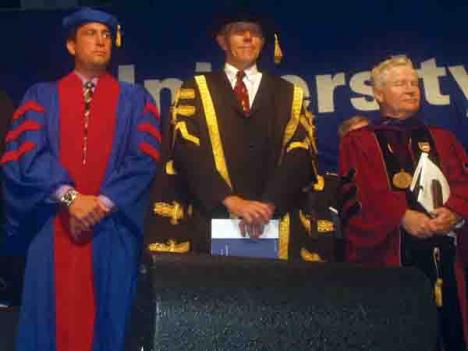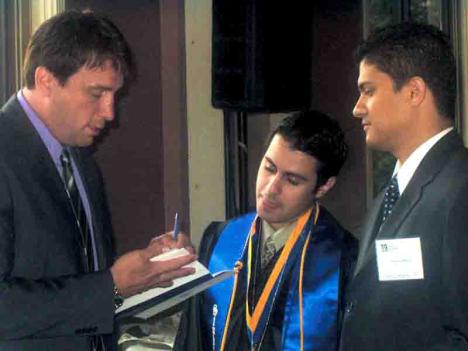Spring Semester Wintry One
May 28, 2003
The news that dominated the campus this spring, and continues to dominate and asphyxiate UMass Boston, is Governor Mitt Romney’s reorganization plan for higher education.
Local media portrayed the affair as a personal battle between Romney and UMass President William Bulger, which even got broadcast nationally once thanks to the Associated Press. Romney’s plan included eliminating Bulger’s office, breaking up its duties and giving them to the five UMass campuses.
Thousands of students, as well as others who would be affected by the budget cuts, rallied at the Statehouse in April, calling on legislators to kill the plan.
Romney administration officials, eager to “dispel myths” about the plan, met with student journalists and government representatives from most of the state’s twenty-nine campuses in late March.
Under Romney’s plan, tuition and fees would be combined as “student charges,” and most of the resulting money would stay on the campus, while the rest would be put towards financial aid. “Student charges” would come with an increase of $838, as opposed to the thousand-dollar fee increase UMass students currently face. The thousand-dollar increase was approved at a Board of Trustees meeting before spring break.
Romney administration officials also took aim at a controversial issue of UMass Boston’s, that of building housing for 15% of its students. Stating that he wasn’t hearing any dialogue, Secretary of Education Peter Nessen said, “Dorms are going to change the mission of UMass Boston, which is a commuter school.”
UMass Boston Chancellor Jo Ann Gora and other UMass Boston officials have repeatedly denied the assertion, and have fought an uphill public relations battle with neighborhood associations and local politicians, including UMB alumnus Boston Mayor Thomas Menino, who are largely united against the idea of dorms.
Weeks earlier, a $371 million dollar bond had been halted by the Romney administration, before it was finally killed in May by Secretary of Administration and Finance Eric Kriss, much to the dismay of many in the administration. The Board of Trustees soon after voted to give President Bulger authority to prioritize construction projects. Bulger called Senator Jack Hart hours later to let him know that the dorms were off the table indefinitely. While Romney lost the battle over eliminating Bulger’s job, he had at least drawn blood from a project important to the UMass president.
The university is still, as it has before, looking for other ways to handle the three thousand requests every year for housing assistance, albeit “more proactively” than before. “[W]e have reorganized our housing office to respond more quickly and effectively to students’ requests. We continue to strengthen our relationship with Harbor Point, where over 250 of our students live, to provide improved services such as reduced rents, fee waivers, and use of common rooms during evenings,” said Chancellor Gora in a recent memo widely distributed to the university community.
UMass Boston was also a home to a large, and some say rabid, anti-war movement. Many UMB students participated in anti-war rallies in New York, Washington D.C., and Boston, as President George W. Bush pushed the country closer to war with Iraq.
War tensions soon gave way to an incident that rocked the campus community. On April 3, a professor and a recruiter from the Army National Guard got into a verbal disagreement. Right before it turned physical, campus police intervened, wrestling the Africana Studies professor to the floor. The scene ended with the recruiter walking away unharmed, Professor Anthony Van Der Meer in police custody, and a large group of shocked onlookers, many of them students, standing on the side.
A press conference was held later that day, with students expressing that they didn’t feel safe on campus at the moment. UMass Boston administrators showed up as well, with Chancellor Gora stating, “It’s deplorable that a faculty member has been arrested.”
The charges against Van Der Meer have not been dropped, but a small group of students are campaigning it with petitions. A police report of the incident has still not been released to The Mass Media.
It hasn’t been all doom and gloom for the campus this mostly cold spring semester. The university is expecting 3 million dollars from the National Science Foundation, “to establish a regional center for advanced technology education in Boston to help meet the projected demand for skilled information technology workers in the Commonwealth,” according to Gora’s May 20 memo. The memo also states the university can expect nearly 1.5 million dollars in the form of a three-year grant, also from the National Science Foundation, this time for the Environmental, Coastal, and Ocean Sciences Department, a 1.8 million-dollar five-year grant from the U.S. Department of Education, and a 1.5 million-dollar five year grant from the U.S. Department of Labor, among others.
A new campus center stands as something to look forward to as well, opening in spring 2004, which Gora says will be celebrated with a “special series of programs and events that will provide fundraising opportunities and serve to raise our visibility in the community.”
The end of the semester also marks the end of Gora’s second year here at the university, having arrived from Old Dominion University in Virginia in August 2001. In a recent interview she remarked that it’s been a “real roller-coaster of experiences and emotions,” and she’s “in it for the long haul.”
“I’ll keep plugging away,” she said.






















































